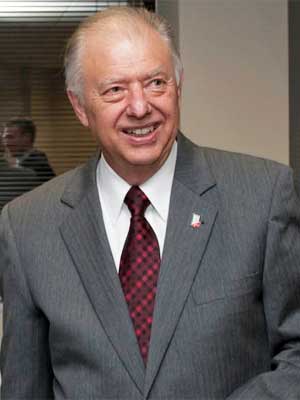Northern Illinois University President John Peters and senior administrators have been actively involved in building consensus on a pension stabilization solution for the State Universities Retirement System (SURS) that enjoys the unanimous support of presidents and chancellors of all Illinois public universities.
The plan – a combination of Senate Bill 1687 and Senate Bill 2591 – is expected to be discussed Tuesday by a Senate panel in Springfield.
The framework is based on an analysis published by the respected University of Illinois Institute for Government & Public Affairs (IGPA) in March, 2013, titled “Reforming SURS: Six Simple Steps.”
The six-step plan would reduce unfunded liability within the SURS system by 28 percent, from $20.2 billion to $14.6 billion, resulting in 100 percent funding by 2044. The state also would see a 47.3 percent reduction in pension contributions over the next three decades, from $76.1 billion to $40.1 billion.
The legislation would phase in the employer cost of pensions from the state to the universities at a rate of 0.5 percent per year as well as require increased employee contributions toward retirement benefits. Once retired, annuitants would receive cost-of-living adjustments tied to the rate of inflation.
“The proposal represents a shared sacrifice between universities, the state and employees and provides necessary steps to strengthen and restore our pension system,” Peters says. “It is a significant burden, but by taking on this responsibility we can protect our faculty and staff moving forward.”
A key feature of the plan is the creation of a new new hybrid Defined Benefit / Defined Contribution plan for new employees, without additional cost to the state.

NIU acting executive vice president Steve Cunningham is among the authors of the Six Simple Steps plan and has been deeply involved in pension reform activity in Springfield. For over two years, he and Peters have been working diligently to educate state policymakers about the nuances of public higher education and that the SURS reforms must be approached differently than other state agencies (SERS) or elementary and secondary education (TRS) when it comes to pension issues.
“It is important for Illinois public higher education institutions to compete with other universities – public and private – across the country for top professors,” says Cunningham. “The success of any university is directly tied to the quality of its faculty and staff, and we are working hard to explain that it’s in lawmakers’ best interests to recognize that we are unique. Crippling higher education will ultimately make Illinois a far less desirable destination for businesses in need of an educated workforce.”
In return for taking on added costs now borne by state taxpayers, universities would receive more flexibility in purchasing, hiring and inventory control, which are key to minimizing the effect of the cost shift on student tuition and fees.
“We are committed to this solution as a compromise that protects the quality of our state universities,” adds NIU vice president for University Relations Kathy Buettner, who has joined Peters and Cunningham in Springfield advocating for the proposal. “It saves the state billions of dollars, is actuarially sound, and we believe it passes constitutional muster. Most importantly, it is a reasonable and responsible measure that maintains the viability of SURS while giving public universities the ability to effectively compete for talented faculty and staff.”
The legislation is scheduled to come before the Senate Executive Committee at 3 p.m. Tuesday, June 18, in Springfield. Peters and Cunningham will present testimony in support of the plan and answer questions. If the legislation is approved by the Senate Executive Committee, it could come before the full Senate for approval as early as Wednesday, June 19.
Related:
- Compromise on pensions (Chicago Sun-Times)
- Six simple steps to pension reform (Crain’s Chicago Business)
- Universities offer partial Illinois pension fix (Associated Press)
- Poshard supports pension plan (The Southern Illinoisan)

